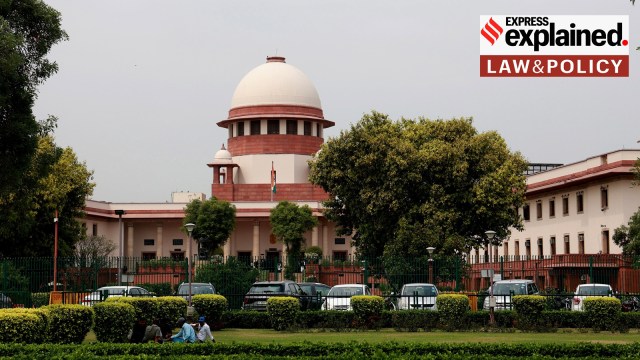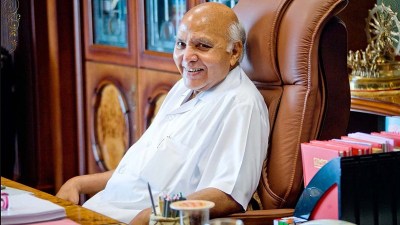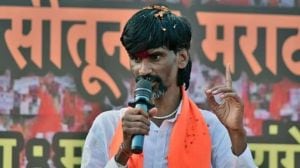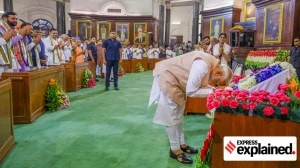- India
- International
Explained: When the Supreme Court stepped in against bail conditions imposed by various high courts
From a man accused of sexual assault being told to tie a rakhi on his alleged victim’s wrist, to preventing an accused from participating in political activities, here’s why the top court quashed high courts’ bail conditions in some recent cases.
 On January 3, last year, an SC bench of Justices Krishna Murari and V. Ramasubramanian ruled that the “conditions of bail cannot be so onerous that their existence itself tantamounts to refusal of bail”. (Express photo by Amit Mehra)
On January 3, last year, an SC bench of Justices Krishna Murari and V. Ramasubramanian ruled that the “conditions of bail cannot be so onerous that their existence itself tantamounts to refusal of bail”. (Express photo by Amit Mehra)The Supreme Court recently ruled that imposing a bail condition that prevents a person from participating in political activities violates their fundamental rights under the Constitution.
In doing so, a bench of Justices BR Gavai and Sandeep Mehta set aside such a condition set by the Orissa High Court in an earlier order for BJP leader Siba Shankar Das. What did the court say in this case, and when have bail conditions been struck down earlier? We explain.
First, how bail and bail conditions work
Bail refers to the temporary prison release of a person awaiting trial or an appeal. It is secured by depositing security before a legal authority as a guarantee for his eventual presence in court.
While exercising its discretion to release a person on bail, the court must ensure it acts “judiciously”, the Supreme Court observed in ‘Khilari vs. State of UP’ (2009). It also ruled that the appellate court must record its reasons while granting bail.
Additionally, Section 439 of the CrPC states that a high court or court of session can direct any accused person in custody to be released on bail.

It also allows them to impose any condition that they consider necessary for the purposes of Section 437(3), which lists conditions that can be imposed in cases of offences punishable with seven years or more in prison. These include ensuring the accused doesn’t commit a similar offence and that he doesn’t threaten persons associated with the case.
What was the Orissa HC order?
In ‘Siba Shankar Das @ Pintu vs. State of Odisha’ the apex court was dealing with a petition filed by BJP leader and former Berhampur mayor Siba Shankar Das. He challenged an earlier order of the Orissa HC.
On January 18, the HC rejected Das’s plea to withdraw a condition imposed on him on August 11, 2022, for granting him bail in a criminal case. The High Court’s condition said that “the appellant shall not create any untoward situation in public and shall not be involved in any political activities, directly or indirectly.”
Das argued before the HC that as a political person who was earlier elected as the Berhampur Municipal Corporation’s mayor, he should be allowed to participate in political activities, given the upcoming general elections.
However, the state government contested Das’s plea, arguing that after his release on bail, Das had been involved in new cases and a “murderous attempt” was also made against him, where a bomb was hurled onto his vehicle. It also supplied the court with an affidavit from the local police inspector, objecting to Das’s plea and citing two new FIRs registered against him in October 2023.
Observing that the petitioner “is always under a life threat”, a bench of Justice B.P. Routray said that lifting the condition “at this juncture, shall in all probability put the administration to enough difficulties.” The court also added that Das was allegedly involved in 57 cases earlier.
Challenging this order, Das moved the top court.
What did the top court rule?
On March 22, a two-judge bench of the Supreme Court set aside the Orissa HC order, saying that “imposition of such condition would breach the fundamental rights of the appellant and no such conditions could have been imposed.” Subsequently, the court said it was quashing and setting aside the condition.
However, this wasn’t the first time the top court quashed bail conditions it deemed unreasonable.
SC on Andhra Pradesh HC bail conditions
Last year, the Andhra Pradesh government challenged a high court order that granted bail to Telugu Desam Party (TDP) chief and former Andhra Pradesh Chief Minister N. Chandrababu Naidu.
On November 28, 2023, a bench of Justices Bela Trivedi and SC Sharma sought a response from Naidu, who was accused in the Andhra Pradesh Skill Development Corporation scam case.
In doing so, the court lifted the Andhra Pradesh High Court’s directive, which prevented Naidu from taking part in public rallies and meetings as a condition for his release on bail. “Issue notice. Returnable on December 8. The conditions imposed in the bail order shall be continued except participation in public rallies and meetings,” the bench said.
The AP HC had converted Naidu’s four-week interim medical bail in the case to absolute bail on November 20. It ordered his release on regular bail, given his age and related ailments, non-flight risk, and other reasons.
SC on Rajasthan, Allahabad, MP high courts’ bail conditions
On January 3, last year, a bench of Justices Krishna Murari and V. Ramasubramanian ruled that the “conditions of bail cannot be so onerous that their existence itself tantamounts to refusal of bail”.
Its ruling came as it quashed a condition imposed by the Rajasthan HC, directing the accused to deposit a Rs one lakh fine along with a surety of another lakh, and two further bail bonds of Rs 50,000 each.
Similarly, on July 22, 2022, a bench of Justices AM Khanwilkar and JB Pardiwala set aside a bail condition that Allahabad HC imposed, asking to seal the Mohammad Ali Jauhar University in Rampur while granting bail to Samajwadi Party leader Azam Khan.
“This is yet another matter where we find that the High Court has referred to matters which are unrelated to the consideration of prayer for bail in reference to the crime registered against the concerned accused,” the court said.
In March 2021, the top court set aside a Madhya Pradesh HC ruling, where it had asked a man accused of sexual assault to get a rakhi tied on his wrist by the victim as a pre-condition for getting bail.
Acting on a plea filed by Supreme Court advocate Aparna Bhat and eight other women challenging the HC order, a bench of Justices AM Khanwilkar and Ravindra Bhat issued directions to be followed by lower courts while dealing with bail petitions in matters of crimes against women.
The SC said that courts should refrain from requiring or permitting contact between the accused and the victim and protect the complainant from further harassment by the accused.
“Bail conditions and orders should avoid reflecting stereotypical or patriarchal notions about women and their place in society, and must strictly be in accordance with the requirements of the CrPC,“ the court also said in its order.
More Explained
EXPRESS OPINION
Jun 08: Latest News
- 01
- 02
- 03
- 04
- 05






























